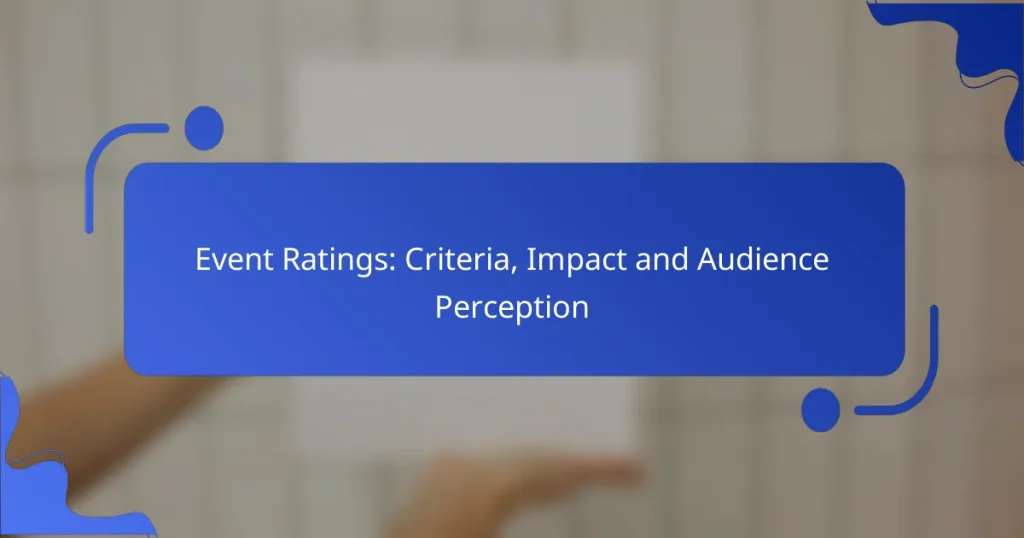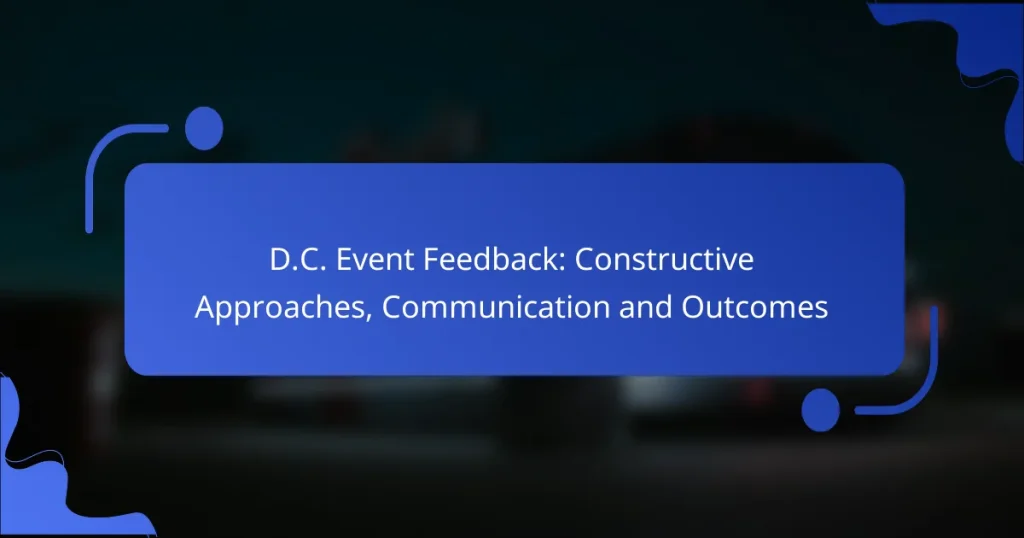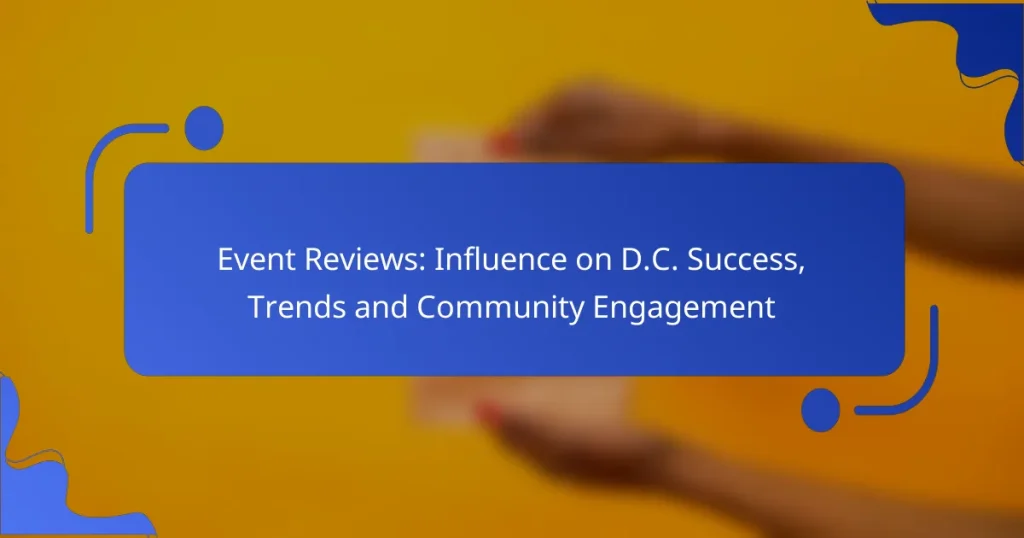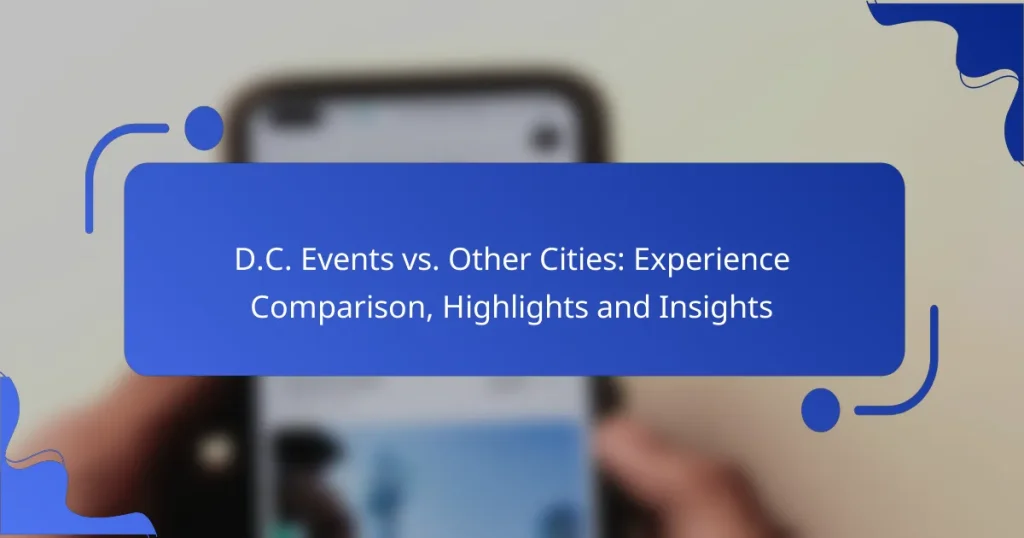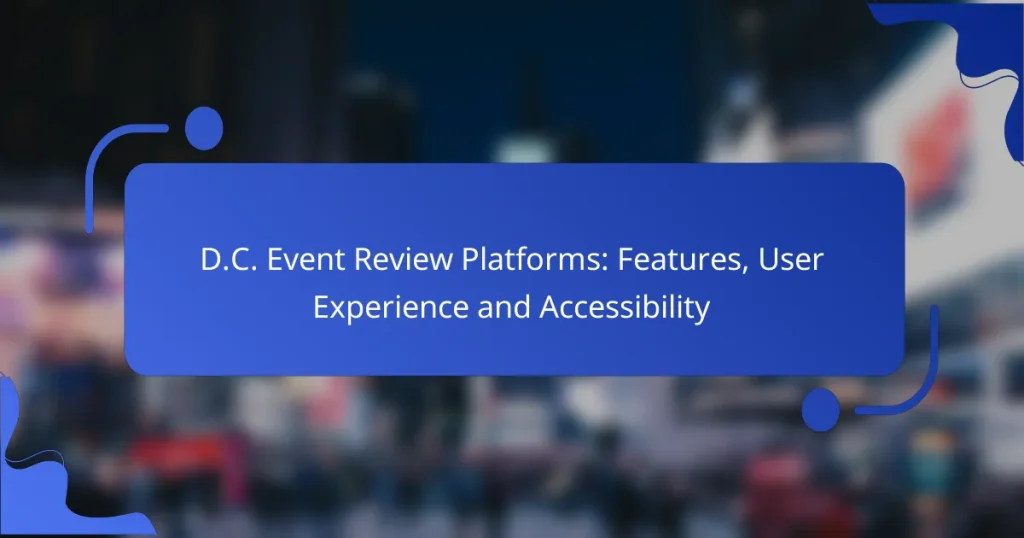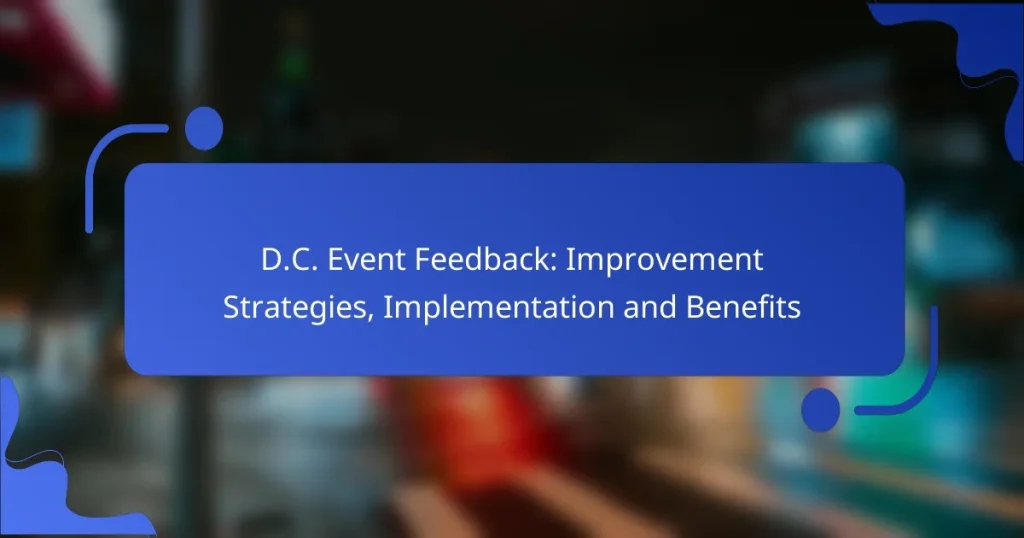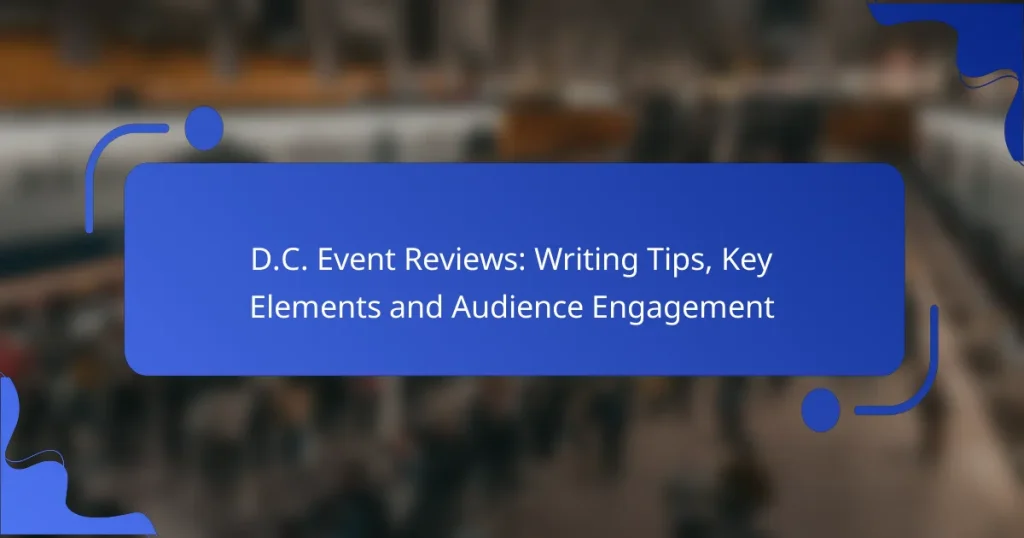Event reviews and feedback play a crucial role in enhancing the quality of gatherings in Washington, D.C. By employing various methods such as online surveys and social media engagement, organizers can effectively capture attendee insights. Utilizing platforms like Eventbrite and Facebook Events ensures that feedback is tailored to the specific needs of different events and audiences.
D.C. Event Feedback: Constructive Approaches, Communication and Outcomes
Event Reviews: Influence on D.C. Success, Trends and Community Engagement
D.C. Events vs. Other Cities: Experience Comparison, Highlights and Insights
D.C. Event Review Platforms: Features, User Experience and Accessibility
D.C. Event Feedback: Improvement Strategies, Implementation and Benefits
D.C. Event Reviews: Writing Tips, Key Elements and Audience Engagement
How to gather event reviews in Washington, D.C.?
Gathering event reviews in Washington, D.C. involves utilizing various methods to collect feedback from attendees. Effective strategies include online surveys, social media engagement, and post-event feedback forms, each offering unique advantages for capturing participant insights.
Online survey platforms
Online survey platforms are a popular choice for collecting event reviews due to their ease of use and accessibility. Tools like SurveyMonkey or Google Forms allow event organizers to create customized questionnaires that can be distributed via email or social media.
When designing surveys, keep questions concise and focused on specific aspects of the event, such as venue, speakers, and overall satisfaction. Aim for a completion time of under five minutes to encourage higher response rates.
Social media engagement
Engaging with attendees on social media is an effective way to gather real-time feedback and reviews. Platforms like Twitter, Facebook, and Instagram can be used to post questions or polls, encouraging participants to share their thoughts and experiences.
Utilize event-specific hashtags to streamline feedback collection and monitor conversations. Responding to comments and messages can also foster a sense of community and encourage more attendees to share their opinions.
Post-event feedback forms
Post-event feedback forms are a direct method for collecting reviews immediately after an event concludes. Distributing these forms in person or via email ensures that attendees can provide their thoughts while the experience is still fresh in their minds.
Include a mix of quantitative ratings and open-ended questions to capture both measurable data and detailed insights. Offering a small incentive, such as a discount on future events, can also increase participation rates.
What are the best platforms for event feedback in Washington, D.C.?
The best platforms for event feedback in Washington, D.C. include Eventbrite, Facebook Events, and Meetup. Each platform offers unique features that cater to different types of events and audiences, making it essential to choose the right one based on your specific needs.
Eventbrite
Eventbrite is a popular choice for event organizers in Washington, D.C. due to its user-friendly interface and extensive reach. It allows attendees to leave feedback directly on the event page, which can be invaluable for improving future events.
When using Eventbrite, consider enabling post-event surveys to gather more detailed insights. You can ask specific questions about the venue, speakers, and overall experience, which can help you make informed decisions for future planning.
Facebook Events
Facebook Events provides a robust platform for gathering feedback from attendees in Washington, D.C. Its integration with social media allows for easy sharing and interaction, making it simple for attendees to leave comments and reviews.
To maximize feedback on Facebook Events, encourage attendees to share their thoughts in the event discussion or post-event survey. Engaging with comments can also foster a sense of community and encourage more detailed responses.
Meetup
Meetup is ideal for community-driven events in Washington, D.C. It focuses on bringing people together based on shared interests, making it easier to gather feedback from a targeted audience. Attendees can rate events and leave comments, which helps organizers understand what worked well and what could be improved.
For effective feedback collection on Meetup, consider following up with attendees via email after the event. This can prompt them to provide more thoughtful feedback and suggestions, enhancing the overall quality of future meetups.
How to analyze event feedback effectively?
To analyze event feedback effectively, focus on gathering both quantitative and qualitative data to understand attendee sentiments and areas for improvement. This involves using various tools and methods to extract insights that can guide future event planning.
Sentiment analysis tools
Sentiment analysis tools help you gauge the emotional tone of feedback by categorizing responses as positive, negative, or neutral. These tools typically use natural language processing (NLP) algorithms to analyze text from surveys, social media, or reviews.
Popular sentiment analysis tools include Google Cloud Natural Language, IBM Watson, and Lexalytics. When selecting a tool, consider factors like ease of use, integration capabilities, and cost, which can range from free to several hundred dollars per month depending on features.
Data visualization software
Data visualization software transforms raw feedback data into visual formats like charts and graphs, making it easier to identify trends and patterns. Tools such as Tableau, Microsoft Power BI, and Google Data Studio are commonly used for this purpose.
When using data visualization, focus on key metrics such as attendee satisfaction scores and common feedback themes. Ensure your visuals are clear and accessible, as this will facilitate better understanding among stakeholders.
Qualitative coding methods
Qualitative coding methods involve categorizing open-ended feedback into themes or codes to identify common issues or suggestions. This process can be manual or supported by software like NVivo or MAXQDA, which streamline the coding process.
To effectively code feedback, develop a coding framework based on initial reviews of the data. Aim for consistency in applying codes, and consider involving multiple team members to enhance reliability. This method is particularly useful for uncovering nuanced insights that quantitative data may overlook.
What are common challenges in collecting event feedback?
Collecting event feedback often faces several challenges that can hinder the effectiveness of the process. Key issues include low response rates, bias in feedback, and the timing of feedback requests, each of which can impact the quality and quantity of insights gathered.
Low response rates
Low response rates are a significant challenge when gathering feedback from event attendees. Many participants may feel disengaged or overwhelmed, leading to a lack of motivation to complete surveys or provide comments. To improve response rates, consider offering incentives such as discounts for future events or entry into a raffle.
Additionally, simplifying the feedback process by using short surveys or quick polls can encourage more attendees to share their thoughts. Aim for a response rate of at least 20-30% to ensure that the feedback collected is representative of the overall attendee experience.
Bias in feedback
Bias in feedback can skew the results and lead to misleading conclusions about the event’s success. This bias may stem from several factors, including the wording of questions, the method of data collection, or the demographics of respondents. For instance, if only highly engaged attendees provide feedback, the results may not reflect the views of less vocal participants.
To mitigate bias, use a mix of qualitative and quantitative questions and ensure that your survey reaches a diverse audience. Random sampling techniques can also help in obtaining a more balanced view of attendee experiences.
Timing of feedback requests
The timing of feedback requests plays a crucial role in the quality of responses received. Asking for feedback too soon after the event may catch attendees off-guard, while waiting too long can lead to fading memories and less accurate responses. A good practice is to send feedback requests within 24-48 hours after the event, when experiences are still fresh.
Consider using multiple channels for feedback collection, such as email, social media, or event apps, to reach attendees where they are most comfortable. This approach can enhance response rates and the richness of the feedback received.
How to improve response rates for event feedback?
Improving response rates for event feedback involves strategic planning and execution. By implementing effective incentives, timing your requests appropriately, and personalizing follow-ups, you can significantly enhance participant engagement.
Incentives for participants
Offering incentives can motivate attendees to provide feedback. Consider options like gift cards, discounts on future events, or exclusive access to content. These rewards can increase response rates by appealing to participants’ interests.
It’s essential to ensure that the incentives are relevant and valuable to your audience. For instance, if your event targets professionals, a discount on industry-related services may be more appealing than a general gift card.
Timing feedback requests
Timing is crucial when requesting feedback. Sending requests shortly after the event, ideally within a day or two, can capture fresh impressions and insights. Delaying the request may lead to lower response rates as memories fade.
Consider the context of your event as well. For larger conferences, a follow-up email the day after can be effective, while smaller gatherings may benefit from immediate feedback requests during the event itself.
Personalized follow-ups
Personalizing follow-up messages can significantly enhance response rates. Address participants by name and reference specific aspects of the event they attended. This approach makes the request feel more genuine and increases the likelihood of a response.
Utilize tools that allow for segmentation of your audience to tailor messages based on their interests or roles. For example, a speaker might receive a different follow-up than a general attendee, acknowledging their unique experience at the event.
What are the legal considerations for collecting feedback in Washington, D.C.?
When collecting feedback in Washington, D.C., organizations must navigate various legal considerations, particularly regarding data privacy and consent. Understanding these regulations is crucial to ensure compliance and protect individuals’ rights.
Data privacy regulations
Washington, D.C. has specific data privacy regulations that govern how organizations collect, store, and use personal information. The D.C. Consumer Protection Procedures Act provides guidelines on obtaining consent and ensuring transparency when handling consumer data.
Organizations must inform individuals about the purpose of collecting feedback and how their data will be used. This includes providing clear privacy notices and obtaining explicit consent before collecting sensitive information.
To comply with these regulations, businesses should implement data protection policies, conduct regular training for staff, and establish procedures for responding to data breaches. Regular audits can help ensure adherence to legal requirements and build trust with consumers.
